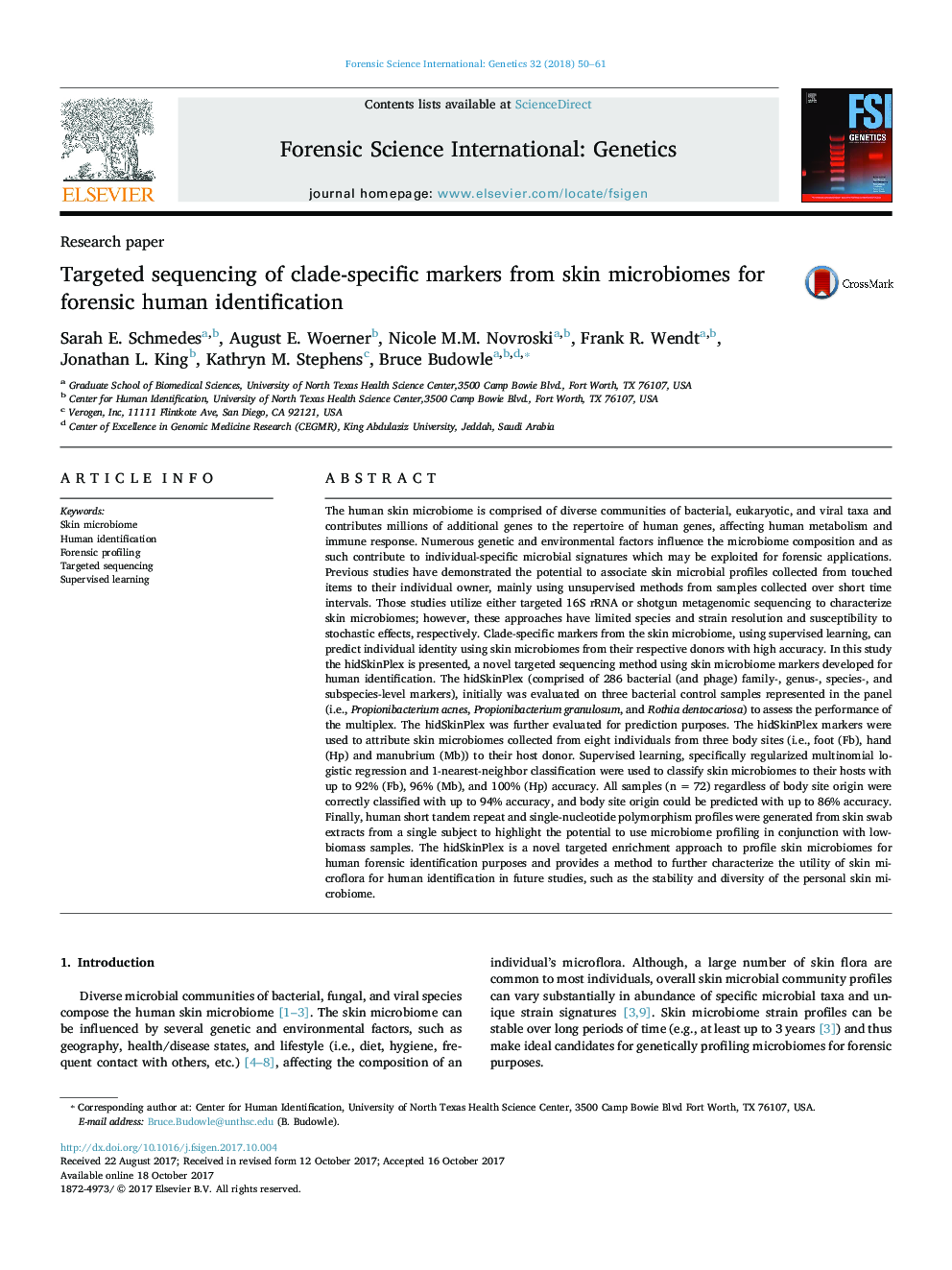| کد مقاله | کد نشریه | سال انتشار | مقاله انگلیسی | نسخه تمام متن |
|---|---|---|---|---|
| 6553356 | 1422146 | 2018 | 12 صفحه PDF | دانلود رایگان |
عنوان انگلیسی مقاله ISI
Targeted sequencing of clade-specific markers from skin microbiomes for forensic human identification
ترجمه فارسی عنوان
تعیین هدفمند نشانگرهای خاص از مایکروبیوم پوست برای تشخیص انسانی
دانلود مقاله + سفارش ترجمه
دانلود مقاله ISI انگلیسی
رایگان برای ایرانیان
کلمات کلیدی
میکروبیوم پوست، شناسایی بشر، پروفیل قانونی، توالی هدفمند، نظارت بر یادگیری،
موضوعات مرتبط
علوم زیستی و بیوفناوری
بیوشیمی، ژنتیک و زیست شناسی مولکولی
ژنتیک
چکیده انگلیسی
The human skin microbiome is comprised of diverse communities of bacterial, eukaryotic, and viral taxa and contributes millions of additional genes to the repertoire of human genes, affecting human metabolism and immune response. Numerous genetic and environmental factors influence the microbiome composition and as such contribute to individual-specific microbial signatures which may be exploited for forensic applications. Previous studies have demonstrated the potential to associate skin microbial profiles collected from touched items to their individual owner, mainly using unsupervised methods from samples collected over short time intervals. Those studies utilize either targeted 16S rRNA or shotgun metagenomic sequencing to characterize skin microbiomes; however, these approaches have limited species and strain resolution and susceptibility to stochastic effects, respectively. Clade-specific markers from the skin microbiome, using supervised learning, can predict individual identity using skin microbiomes from their respective donors with high accuracy. In this study the hidSkinPlex is presented, a novel targeted sequencing method using skin microbiome markers developed for human identification. The hidSkinPlex (comprised of 286 bacterial (and phage) family-, genus-, species-, and subspecies-level markers), initially was evaluated on three bacterial control samples represented in the panel (i.e., Propionibacterium acnes, Propionibacterium granulosum, and Rothia dentocariosa) to assess the performance of the multiplex. The hidSkinPlex was further evaluated for prediction purposes. The hidSkinPlex markers were used to attribute skin microbiomes collected from eight individuals from three body sites (i.e., foot (Fb), hand (Hp) and manubrium (Mb)) to their host donor. Supervised learning, specifically regularized multinomial logistic regression and 1-nearest-neighbor classification were used to classify skin microbiomes to their hosts with up to 92% (Fb), 96% (Mb), and 100% (Hp) accuracy. All samples (n = 72) regardless of body site origin were correctly classified with up to 94% accuracy, and body site origin could be predicted with up to 86% accuracy. Finally, human short tandem repeat and single-nucleotide polymorphism profiles were generated from skin swab extracts from a single subject to highlight the potential to use microbiome profiling in conjunction with low-biomass samples. The hidSkinPlex is a novel targeted enrichment approach to profile skin microbiomes for human forensic identification purposes and provides a method to further characterize the utility of skin microflora for human identification in future studies, such as the stability and diversity of the personal skin microbiome.
ناشر
Database: Elsevier - ScienceDirect (ساینس دایرکت)
Journal: Forensic Science International: Genetics - Volume 32, January 2018, Pages 50-61
Journal: Forensic Science International: Genetics - Volume 32, January 2018, Pages 50-61
نویسندگان
Sarah E. Schmedes, August E. Woerner, Nicole M.M. Novroski, Frank R. Wendt, Jonathan L. King, Kathryn M. Stephens, Bruce Budowle,
